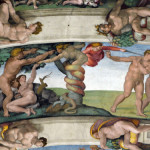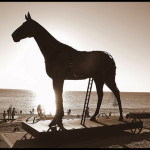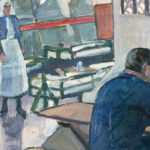We run our website the way we wished the whole internet worked: we provide high quality original content with no ads. We are funded solely by your direct support. Please consider supporting this project.

The Nature of Human Rebellion
God placed Adam in the Garden and instructed him to “protect” it (Gen. 2:15). The word is often translated “till” or “keep,” implying that Adam’s main responsibility was to protect the pristine Garden from weeds. This is certainly a possible interpretation of this word, but in light of the cunning serpent that shows up in the very next chapter, we suspect Adam was supposed to protect the Garden from something much worse than weeds. Besides, the narrative suggests that things like weeds didn’t appear in the Garden until after the rebellion.
The serpent is described simply as the most cunning beast that God made (Gen. 3:1). However, in ancient near eastern culture, the serpent was often a symbol of evil. New Testament authors as well as most theologians in the early church assumed that the serpent was either an animal-incarnation or a symbolic representation of Satan. Whatever aspects of this story we interpret literally or figuratively (the church has never insisted on one way of interpreting this story), it seems very clear that Satan was seeking to co-opt our primordial parents into his rebellion— and, tragically, it worked.
Out of love, God had placed two trees in the middle of the Garden. One was the “Tree of Life” and the other was “The Tree of the Knowledge of Good and Evil.” The first represents God’s provision of everlasting life with him while the second represents God’s “No Trespassing” sign. The two trees were God’s loving way of reminding the first couple that the beautiful life God intended for humans revolved around their trusting him as their source for life, while honoring the boundary between them and God. God alone is final judge of the world, and, for us to be like God in how we love, we must refrain from trying to be like God in how we judge.
The way the serpent deceived Eve—and continues deceive people today—was by convincing her that God was not altogether good. This is the way rebellion against God works. Satan convinced Eve that God did not have her and Adam’s best interest at heart when he forbade them to eat from the mysterious tree. Indeed, the serpent actually suggested that God had acquired his own omniscience by eating from this tree and that God’s motive for forbidding Eve to eat from it was that he didn’t want any competition (Gen. 3:5). If Eve would violate this “No Trespassing” sign, the serpent suggested, she could improve her lot in life and be “like God, knowing good and evil.”
The moment Eve accepted this pathetic picture of God, she no longer trusted her Creator to be her sole source of life. When she looked at the tree through the lens of her newly acquired false picture of God, the poisonous fruit of the forbidden tree seemed “good for food,” “pleasuring to the eye,” and “desirable for gaining wisdom” (Gen. 3:6). As Eve’s fallen descendants, the same thing happens to us. Whenever we’re not trusting God and getting our sense of fullness of life from him, we look at the world with hungry eyes and things that otherwise would not seem “eatable” begin to look delicious. If our souls were satisfied with the fullness of life our Father longs to pour into us, we would never suspect that things like power, pleasures, possessions, fame, knowledge, or disobeying God in any way could be a way to acquire our ultimate worth, significance or security. These things take on an appealing appearance only because we view them through hungry eyes.
Under the delusion of her demonically-inspired false picture of God, Eve rebelled against God and tried to acquire life for herself by eating from the forbidden Tree. Adam then followed suit, and God’s beautiful plan for humans was derailed. The same continues today. What lies about God have tempted you to question God’s goodness? What sources outside of God are you trying to use to fill yourself up with life?
—adapted from an unpublished manuscript.
Category: General
Tags: Satan, Sin, Spiritual Warfare
Related Reading

Are you Afraid of Demons?
I remember learning about germs in fourth grade. We were told our world was saturated with tiny invisible creatures that can infect wounds and make us sick. I immediately stopped sharing already-chewed gum with other kids, stop using my sister’s toothbrush and started washing my hands after going to the bathroom. Most kids had similar…

Sinful Nature and Free Will
Q: If our sinful nature is what causes us to sin/reject God, can we be held responsible for our sins, when this nature resulted from Adam and Eve’s sin? Do we really have the freedom to either choose/reject God if our sinful nature compels us to reject God? On the other hand, if our sinful…

Finger-Pointing and the Impulse to Judge
To no one’s surprise, yet to the sadness of many of us, several Christian spokespeople, including James Dobson, Mike Huckabee and Bryan Fischer, are blaming the shootings in Newtown, Conn, on abortion and gay marriage. This is sadly reminiscent of Jerry Falwell’s hurtful response to 9/11 when he divined that “the pagans,” “abortionists,” “feminists,” “gays,” “lesbians,”…

Where Psychology and Theology Meet
Guest post by Ty Gibson The biblical narrative reveals that God bears our guilt—not merely in the penal sense that Reformed theology asserts—but in the sense that He bears our misconceptions of His character as we project our sins upon Him. To the degree that fallen human beings find it psychologically impossible to bear the…

God is Like a Trojan Horse
Yesterday, I introduced a basic understanding of the Christus Victor view of Christ’s work on the cross. [Click here to read it.] Today, I want to expand on this briefly. Because God is a God of love who gives genuine “say-so” to both angels and humans, God rarely accomplishes his providential plans through coercion. God…

Were the Consequences for Adam & Eve’s Choice Fair?
In this episode Greg ponders Adam and Eve’s choice and the enormous consequences of that seeming arbitrary decision. Links: Greg’s book: “God at War“ http://traffic.libsyn.com/askgregboyd/Episode_0021.mp3
